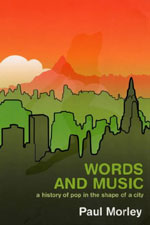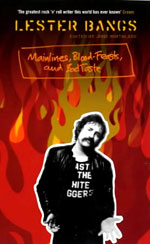Not With Bangs But A Wimp. Errr... | |

|
No, my title is unfair. Paul Morley is no wimp, he's an absolute genius, though of course the two things aren't incompatible. But I digress. But then so does Paul Morley in his brilliant new book. Footnotes, fiction, lists, diatribes, more lists, and a history of the last century are all part of his new book, which is ostensibly about Kylie Minogue but thankfully isn't. I say thankfully because if it was the Kylie biography it sometimes purports to be then I wouldn't have wanted to read it and I'm glad I have. And besides, it would never work as a Kylie biography because there are no pictures.
What's great about Morley's writing is how he manages to be opinionated, unfocussed and unable to follow his themes but pull the raggle-taggle themes that he offers the reader together every few pages, in an amazing sleight of hand. He did it with his last book, Nothing, too, and in a less obvious way in his first book, Ask, where he let the subjects he interviewed [asked; geddit?] weave their own connections and links, and the reader draw their own conclusions. In Words and Music it's Morley who every so often holds forth and we realise how all the little bits of information, story and opinion we have been reading is simply fuel for a wodge of Morley. He's at his best when he lets rip though. My favourite part of the book is an utterly brilliant, true and compelling rant about Simon Fuller and Pop Idol, which not only makes the case for the prosecution of this appalling programme, but also takes the piss and makes you laugh, and also manages to tell it like it is about what happens when pop tries to change things in its attitudes and music, but is permanently compromised by the business it's part of. Of course, these lucid moments are moments within 350 pages or so of rambling. For me, they are the backbone of the book. I get a bit tired of his Kylie-robot driving him across the musical landscape, got a bit tired of lists of things. But then I also managed to know about 80 per cent of his musical references and share most of his opinions, so in the end I warm to the guy anyway. And only Morley would be mad enough to offer a year by year chronology-cum-discography of a century of popular music that includes key events, influences, sources, moments and such in a glorious, sometimes fictional, always irreverent, manner. My own list of favourite music books includes: David Toop, Ocean of Sound Michael Bracewell, England is Mine Simon Reynolds, Blissed Out Graham Lock, Forces in Motion Da Capo Best Music Writing series Clinton Heylin, From the Velvets to the Voidoids Alistair Fitchett, Young & Foolish Eno, A Year with Swollen Appendices Evan Eisenberg The Recording Angel John Zorn [ed.], Arcana Paul Morley is now being added to this list as I write. |

| On my second tier of
favourite music books, after the works of pure wonder listed above, there's a mass of stuff written by the likes of Barney Hoskyns, Jon Savage, Bill Martin, Giles Smith, Charles Shaar Murray, Simon Frith, Ben Thompson and a whole lot of others. Interviews with musicians, articles about or by them, biography, autobiography, ghosted biography, polemic, histories, reviews and overviews. And then there's the madcap rollercoaster ride that is, or was, Lester Bangs, whose Psychotic
Reactions and Carburetor Dung is the epitomy of motormouth journalist as [almost] rock star in their own write. Bangs' strength is, of course, that he seemed to get away with it. It wasn't that he hung around with the right guys and 'knew the band', nor that he lived a rock & roll lifestyle [tho sometimes he did], it was just the whole attitude that was a main part of his writing. If writing could strut and swagger and shout, then Bangs' writing
did. Still does on a good day. For me though, Mainlines, Blood Feasts and Bad Taste isn't a particularly good day. Some of it, I'm sure, is that I simply am not interested in a lot of the stuff that's being written about here; some of it, I'm just as sure, is that it's not very good writing - it's nowhere near as lucid and interesting or as focussed as most of Carburetor Dung is. And since Psychotic Reactions was an edited 'best of' by someone else, then one can only assume that it really was a best of and the rest ain't so good. For me it's epitomised by the Eno piece in the book, here merely a squib spread over a couple of pages. Fortuitously, however, the online magazine Perfect Sound Forever have the complete article up in their current issue, where it is about six times as long. Sure, it rambles, meanders and occasionally grinds to a halt, but it's thorough, individual and extensive; it gives an overview of Eno's career, some opinion, and a review; it's more truly a Lester Bangs piece in its entirety than the cut version in the book. Of course, there's some great stuff here, often about musicians I do want to read about: Miles, Eno, John Lydon, Captain Beefheart, Patti Smith; but there are also pieces about the Stones, Lou Reed and Ian Hunter, who I don't. And that, perhaps, is the problem. This stuff is becoming historical, it's at the very least 20 years old, often a lot more. It's archival, its from a different age, it's rooted in a world of rock, a world before hiphop, rap and dance music, synthesizers and computers, changed the face of music for ever, like it or not. Bangs was one of the last music journalists riding on the New Journalism wave, where the writer featured in the article, was present in it, in fact often became the article. Lester Bangs is in this writing, in every sense of things. But Paul Morley is too slippery a fish for that. He's one of the original NME postmodernists, with as many disguises, sleights of hand, and changing opinions as a man can have. He can reinvent himself each morning. Probably does. We never get to meet 'Paul Morley' on the pages of Words and Music, but the attempt to understand the Paul Morley who is there, is far more intriguing a read than the unreformed dead rocker Lester Bangs. Paul Morley's 'history of pop' is only one version of things, but for the moment it will do. Lester Bangs' version is, I only fear, only another appendix or set of footnotes. © 2003 Rupert Loydell |